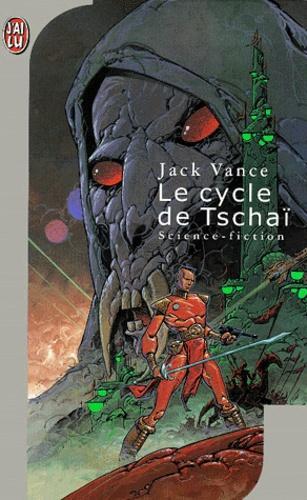Tschai, Planet of Adventure
No rating
Adam Reith and company are on a response mission to the planet Tschai, 212 light years away, after receiving a signal. Their reconnaissance craft soon gets hit by a missile from the planet's surface, stranding Reith with little hope of return.
Tschai hosts four distinct races who are at odds with each other to varying degrees. The Chasch, industrious urbanites, the Dirdir, highly stratified sport hunters; the Wankh, inscrutable in their cities of black glass, and hovering above (below) it all, the Pnume, aloof insectoid chroniclers of the surface's changing fortunes, a morbid subterranean priesthood. All four races employ a sub-race - mankind - or Chaschmen, Dirdirmen, Wankhmen and Pnumekin - brought to Tschai millennia ago in mysterious circumstances. Planet of Adventure is an escape story at first glance, and a good one, but it's also portrait of an alternate humanity that is profoundly dysfunctional, robbed of its inclinations to …
Adam Reith and company are on a response mission to the planet Tschai, 212 light years away, after receiving a signal. Their reconnaissance craft soon gets hit by a missile from the planet's surface, stranding Reith with little hope of return.
Tschai hosts four distinct races who are at odds with each other to varying degrees. The Chasch, industrious urbanites, the Dirdir, highly stratified sport hunters; the Wankh, inscrutable in their cities of black glass, and hovering above (below) it all, the Pnume, aloof insectoid chroniclers of the surface's changing fortunes, a morbid subterranean priesthood. All four races employ a sub-race - mankind - or Chaschmen, Dirdirmen, Wankhmen and Pnumekin - brought to Tschai millennia ago in mysterious circumstances. Planet of Adventure is an escape story at first glance, and a good one, but it's also portrait of an alternate humanity that is profoundly dysfunctional, robbed of its inclinations to discover, to know, to imagine and create, and in some cases even its resemblance as human. What if we took Us and made us serfs of our domain instead of masters, and let that cook for 100 millennia? asks Vance. The nature of individual liberty and agency are also explored.
Reith teams up with Traz, an adolescent boy with major responsibilities and major totems to uphold, and Anacho, a Dirdirman fugitive. There is little character introspection (Reith is a Neil Armstrong-James Bond of the far future who doesn't have a qualm with kicking heads in if he has to) but they are still competently sketched, as are the supporting cast. The worldbuilding is the true highlight. Tschai is vibrantly colorful yet worn through. Tschai is pungent and rank and unfair and brutally transactional and at home with itself. Tschai works. Yet in retrospect it feels like all Vance ever describes is the color of the sky, the murky light cast by its star Carina 4269, the cuisine, and various episodes of haggling. I still enjoyed my time there.
The four books total about 450 pages. It's effectively a single four-volume novel. Vance doesn't muck around - his plotting and pacing is lean, in contrast to nearly any modern fantasy author, where 450 pages wouldn't see the first book finished. He achieves immersion by means other than padding the time investment. I wish SF/F authors rediscovered the value of basic writing economy (they might actually finish more series). I love Vance's brand of refined pulpiness and plan to read more of him.

